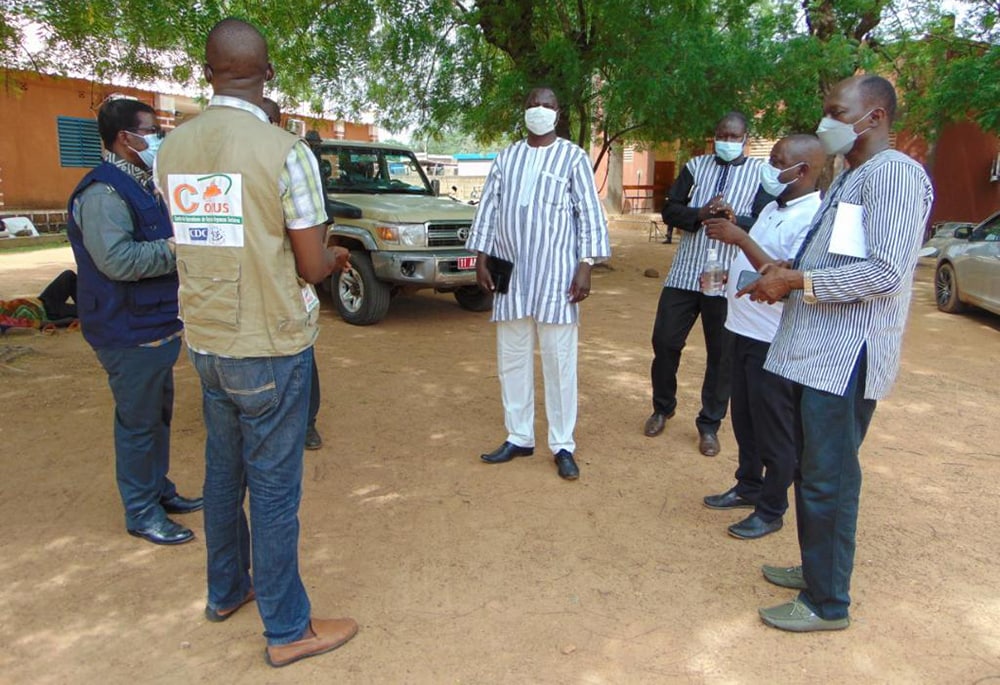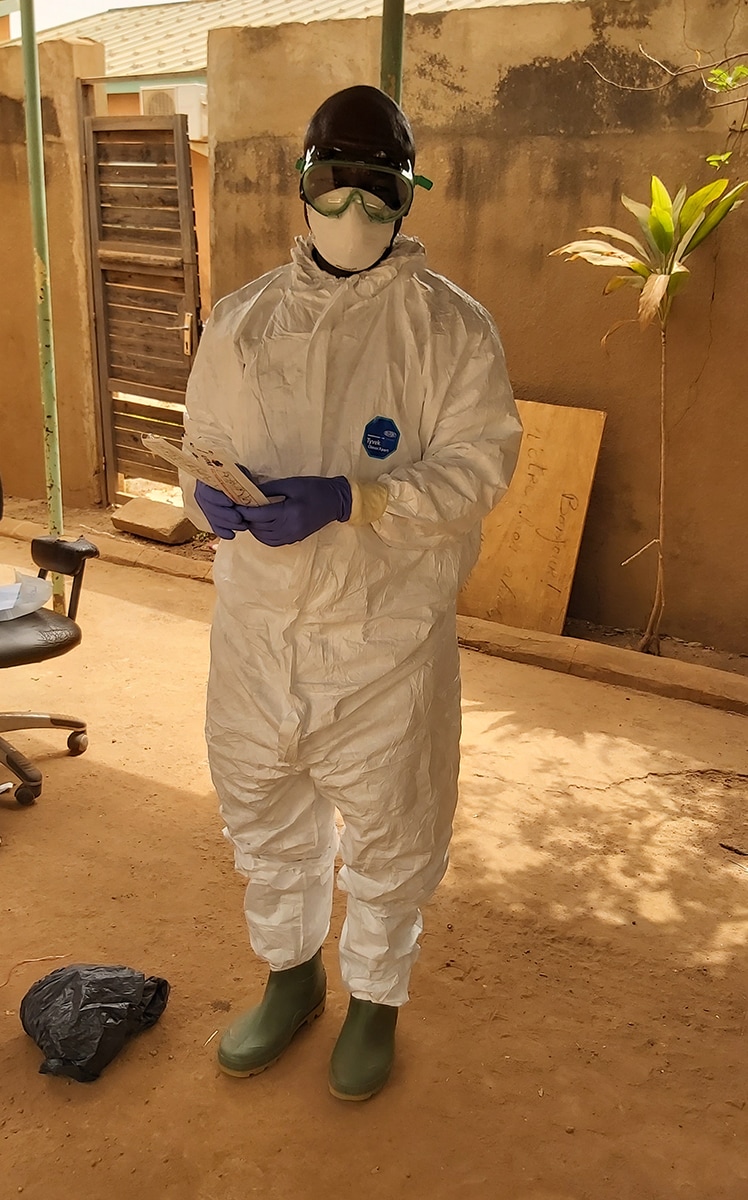Years of NPHI Work Help Burkina Faso Prepare for COVID-19
June 11, 2021
The COVID-19 pandemic has overloaded public health systems worldwide. Countries without a centralized coordination point for scientific expertise and public health systems tend to be less effective and efficient during a public health emergency.

INSP’s COVID-19 emergency response leadership monitors field work in South Central Burkina Faso. Photo: Bicaba Brice, INSP Center for Response Operations and Health Emergencies
Burkina Faso did not hesitate in its COVID-19 response, even though its National Public Health Institute (NPHI), or L’Institut national de santé publique (INSP), and the Emergency Operations Center (EOC) were still in their infancy at the start of the pandemic. Established in 2018 with support from the U.S. Centers for Disease Control and Prevention (CDC), INSP and its EOC have played an essential role in tackling the outbreak. As the virus continued to spread worldwide, Burkina Faso activated its EOC, developed a COVID-19 management plan, and created a pandemic taskforce.
The country’s effective management of the COVID-19 response is due to several factors, including years of preparation, capacity building, and dedication to coordinating public health and emergency management through INSP. In addition, INSP’s comprehensive strategic plan aligned with Burkina Faso’s public health goals, resulting in a unified vision for the country.
Learning from Peers in France and Belgium
In the summer of 2019, INSP leadership visited France’s NPHI (Santé Publique), including its EOC, and Belgium’s NPHI (Sciensano), including its primary laboratory. During these peer-to-peer visits, the team learned about how ministries of health (MOHs) and NPHIs interact, the way MOH leadership defines an NPHI’s role, and how NPHIs should operate. At the time of the visit, Burkina Faso’s newly established INSP had begun setting up their public health operations, so peer-to-peer interactions with long-standing, seasoned NPHIs were especially valuable.
During the visit, Dr. Hervé Hien, the General Director of INSP, shared the country’s progress. NPHI representatives from all three countries discussed lessons learned and best practices that were later adapted to the Burkina Faso context. In addition, the visit helped build relationships and networks that have provided continued collaboration. Most importantly, Burkina Faso’s public health leadership returned home with tools and renewed motivation to create a robust NPHI and build support for a new and improved public health model in the country.
Burkina Faso President Roch Marc Christian Kaboré highlighted the NPHI in his 2021–2025 strategic vision, illustrating the country’s continued commitment to maintaining a strong, coordinated public health body. “I will ensure that the Burkina Faso National Public Health Institute created during my first term will be more active and more visible in health research, the evaluation of public health policies, health monitoring, disease control, and epidemic response.”
Putting Preparation and Plans to the Test for the COVID-19 Pandemic
When the first two cases of COVID-19 in Burkina Faso were confirmed on March 9, 2020, INSP was ready to respond, building on the lessons learned from peers and technical assistance from CDC and other partners.

Collecting a COVID-19 specimen sample during the early stages of the outbreak in Burkina Faso. Photo: Emilie Thérèse Dama, CDC Burkina Faso
For example, INSP mobilized researchers and other professionals to develop and implement strategies guiding the COVID-19 response, and coordinated information sharing through situation reports and data visualization. Throughout these COVID-19 response activities, Dr. Hervé Hien led the documentation of all operational processes so that strategies could be adapted for future outbreaks. Applying newly gained emergency response experience, as well as a vision for future growth, INSP became an integral focal point supporting the prevention and control of COVID-19 and other diseases.
Capturing Lessons Learned for a Stronger NPHI
To better address the ongoing COVID-19 pandemic, INSP conducted a systematic operations review, documenting successes and areas for improvement during the 2020 response. This effort included creating a lessons learned policy brief, as COVID-19 was INSP’s first large emergency response. The results of this review will improve COVID-19 operations, as well as future emergency responses.
These activities have made INSP a leader and model of public health and emergency management system strengthening in West Africa. As such, Dr. Hervé Hien has participated in a series of COVID-19 management best practice webinars with peer NPHIs in French-speaking African countries. CDC will continue to help INSP strengthen its internal organizational capacity and implement its strategic plan to become a trusted resource for global health security in the country, the region, and beyond.
March 2016
Burkina Faso engages CDC for NPHI development
July 2018
Burkina Faso MOH delegation visits CDC headquarters to discuss NPHI establishment
September 2018
Government ministers adopt statutes, formally establishing INSP
June–July 2019
Burkina Faso delegation visits Santé Publique in France and Sciensano in Belgium for peer-to-peer learning experience
March 2020
Burkina Faso’s labs confirm first cases of COVID-19 in-country and EOC activates for first time
June–July 2020
INSP coordinates review of lessons learned amid managing the COVID-19 response
November 2020
President Roch Marc Christian Kaboré highlights INSP in his 2021–2025 strategic vision
- Burkina Faso’s Disease Detective System in Action
- Burkina Faso: Helping Secure the Globe from Outbreaks
- From Mangoes to Meningitis: A Tale of One Laboratory Scientist in Burkina Faso
- Proud to Protect Burkinabè from Meningitis
- Quietly, Burkina Faso Makes Changes That Protect Health At Home and Abroad
